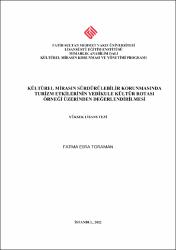Kültürel Mirasın Sürdürülebilir Korunmasında Turizm Etkilerinin Yedikule Kültür Rotası Örneği Üzerinden Değerlendirilmesi
Citation
TORAMAN, Fatma Esra, Kültürel Mirasın Sürdürülebilir Korunmasında Turizm Etkilerinin Yedikule Kültür Rotası Örneği Üzerinden Değerlendirilmesi, Fatih Sultan Mehmet Vakıf Üniversitesi Lisansüstü Eğitim Enstitüsü Mimarlık Anabilim Dalı Kültürel Mirasın Korunması Ve Yönetimi Programı, Yayımlanmamış Yüksek Lisans Tezi, İstanbul 2022.Abstract
Kültür; toplumun edindiği gelenek ve göreneklerin, inanç, ahlak, hukuk ve bütün yetenek ve alışkanlıkların oluşturduğu sosyal olgu olarak ifade edilmektedir. Bu sosyal yapı tarih boyunca üretilenleri kendi içinde barındırararak kazandığı kimlik ile diğer uluslardan farklılaşmaktadır. Kültürel miras ise; toplumsal kimliğe her dönem şekil veren, nesiller boyu aktarılacak olan varlıklardır. Ortak toplumsal bellek ve bu belleklerin kanıtı niteliğinde tarihi değeri taşır. Bu değerlere ilişkin geniş perspektifte koruma sağlanması ve farkındalığın arttırılması yeni yaklaşımları gerekli kılmıştır. Bu bağlamda yeni yaklaşımın temsilcisi olan kültür rotaları; kültürel ve doğal mirasın korunması ile tarihsel bileşenlerin sürdürülebilirliği için etkin bir araçtır. Kültürel miras öğelerinin yaşam şansını arttırmakla beraber kültürler arası diyalogların da sürdürülebilirliğinde önemli rol oynamaktadır.
Dünya üzerine dağılan medeniyetlerin günümüze miras kalmış izleri, sanatsal yapıtları ve köklerini keşfetme arzusu diğer coğrafyalara merak uyandırmıştır. Dolayısıyla kültür ve coğrafya kavramlarına duyulan ilgi turizm hareketlerinin temelini oluşturmaktadır. Ancak kitlesel turist hareketlerine dayandırılan turizm sektörü kırılgan yapıdaki miras öğeleri üzerinde baskıya neden olmaktadır. Tarihi alanların turizm etkisiyle koruma-kullanma dengesinin yitirilmesine karşı duyulan endişe, gelecek nesillerin yararlanmasına karşı da duyulmaktadır. Sürdürülebilir turizm düşüncesinin bir gereksinim olduğunu ortaya çıkaran temel yaklaşım söz konusu değerlerin uzun dönemde bozulmadan kullanılmasını sağlamakla beraber, koruma-kullanma dengesinin yoksunluğunda ortaya çıkabilecek olumsuzlukları en aza indirmek hatta yok etmektir. Kültürel miras elemanlarının tüm bileşenleriyle turizm için çok önemli bir kaynak olduğu açıktır. Bu bağlamda Yedikule Kültür Rotası, kültürel mirasın korunmasında en büyük endişe kaynağı olarak metalaştırma görülerek, böyle bir etkiye alanın maruz kalmaması için titizlikle planlanmıştır.
Rota kapsamında Yedikule Hisarı, Altın Kapı, bostanlar, İmrahor İlyas Bey Camii ile çevresinde bulunan tescilli ahşap konut yapıları ve özgün sokak dokusunu kültürel mirasın tüm bileşenleri ile sürdürülebilir koruma sağlanması amaçlanmaktadır. Önerilen rota aracılığıyla alandaki somut ve somut olmayan kültür varlıklarının kimliğine uygun bir şekilde turizme kazandırılması, güzergâhın sadece fiziksel değil tüm bileşenleriyle sunulması hedeflenmiştir. Böylece kültürel mirasın bu güzergâh aracılığıyla daha okunur kılınarak korunması ve yaşatılması adına farkındalık sağlanması ve korunması planlanmıştır. Culture; It is expressed as a social phenomenon formed by the customs and traditions acquired by the society, beliefs, morality, law, and all abilities and habits. This social structure differs from other nations with the identity it has gained by containing what has been produced throughout history. Cultural heritage is; They are the assets that shape the social identity in every period and that will be passed on for generations. It has historical value as a common collective memory and proof of these memories. Providing protection from a broad perspective and raising awareness of these values necessitated new approaches. In this context, cultural routes represent the new approach; It is an effective tool for the protection of cultural and natural heritage and the sustainability of historical components. Along with increasing the chance of survival of cultural heritage items, it also plays an important role in the sustainability of intercultural dialogues.
The desire to discover the traces, artistic works, and roots of civilizations scattered over the world has aroused curiosity in other geographies. Therefore, the interest in the concepts of culture and geography forms the basis of tourism movements. However, the tourism sector, which is based on mass tourist movements, causes pressure on fragile heritage items. The concern about the loss of the protection-use balance of historical sites due to tourism is also felt for the benefit of future generations. The basic approach that reveals that the idea of sustainable tourism is a necessity is to ensure that the values in question are used without deterioration in the long term while minimizing or even eliminating the negativities that may arise in the lack of protection-utilization balance. It is clear that cultural heritage elements with all their components are a very important resource for tourism. In this context, the Yedikule Cultural Route has been meticulously planned to prevent the area from being exposed to such an impact, considering commodification as the biggest concern in the protection of cultural heritage.
Within the scope of the route, it is aimed to provide sustainable protection of Yedikule Fortress, Altın Kapı, bostans, İmrahor İlyas Bey Mosque, and the registered wooden residential structures and unique street texture with all components of cultural heritage. Through the proposed route, it is aimed to bring the tangible and intangible cultural assets in the area to tourism in accordance with its identity, and to present the route not only with its physical but also with all its components. Thus, it is planned to raise awareness and protect the cultural heritage by making it more readable through this route.



















